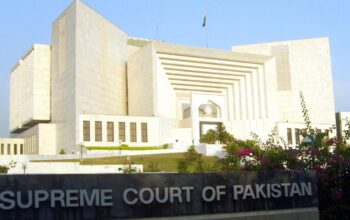By Staff Reporter
KARACHI: Pakistan on Wednesday signed a $1 billion financing deal with the Asian Development Bank (ADB), marking a pivotal step in its fiscal overhaul and heralding its return to international commercial markets after a nearly two-and-a-half-year absence.
The five-year facility, mixing Islamic and conventional loans, highlights growing confidence in the nation’s economy and strengthens ties with Middle Eastern banks.
The Ministry of Finance announced the syndicated term finance facility, partially guaranteed by the ADB’s Policy-Based Guarantee under its “Improved Resource Mobilisation & Utilisation Reform” program.
“The facility is a landmark transaction for the Government of Pakistan that demonstrates strong support from leading financiers in the region,” the ministry said in a statement. It’s the first time the ADB has linked such a guarantee to policy reform measures in a member country, spotlighting Pakistan’s commitment to fiscal stability.
The financing splits into 89% Islamic, AAOIFI-compliant funds and 11% conventional loans. Dubai Islamic Bank led as Sole Islamic Global Coordinator, with Standard Chartered Bank as Mandated Lead Arranger and Bookrunner. Abu Dhabi Islamic Bank, Sharjah Islamic Bank, Ajman Bank, and HBL also joined.
“This transaction also marks the beginning of a new partnership of the Government of Pakistan with Middle Eastern banks,” the ministry added, noting the country’s successful re-entry into the Middle Eastern financial market after a prolonged hiatus.
The ADB’s backing ties the financing to reforms aimed at building “long-term fiscal resilience and stability,” according to the statement. The program has already paved the way for Pakistan’s return to global markets, with “significant interest from Middle Eastern Banks” signaling growing trust in the nation’s macroeconomic indicators.
Earlier this month, the Manila-based lender approved $800 million more to bolster public financial management.
Finance Minister Muhammad Aurangzeb recently outlined the government’s broader ambitions, stating that Pakistan has re-entered the commercial market this fiscal year and is “in the process of syndicating around $2 billion of commercial borrowing.” He expects this to lift foreign exchange reserves from the current $11-12 billion to $14 billion by fiscal year-end.
Khurram Schehzad, an adviser to the finance minister, hailed the deal on X as “Pakistan secures $1bn landmark financing with ADB-backed guarantee and strong Middle Eastern banks’ support.”
Bond Auction Signals Domestic Confidence
The ADB deal coincides with a robust domestic fundraising effort. On Wednesday, the Ministry of Finance raised over Rs1.2 trillion through a government bond auction, including the debut of a 15-year Zero Coupon Bond, the first of its kind in Pakistan, which drew Rs47 billion in bids. Unlike
traditional bonds, this instrument pays no annual interest, instead delivering a lump sum at maturity. “This helps the government reduce short-term repayments and plan finances better,” the ministry said, framing it as part of a strategy to lower borrowing risks and promote long-term investment.
Yields on other government securities fell during the auction, reflecting market optimism about declining inflation and potential rate cuts. The average repayment period for domestic debt has stretched from 2.7 years to 3.75 years, easing refinancing pressures.
The investor base is also diversifying, with pension funds and insurance companies joining banks in snapping up bonds, a shift that broadens financial stability. “This is a major step forward in making Pakistan’s financial system stronger and more resilient,” Aurangzeb said. “We are introducing new, smart ways of borrowing that reduce risk and give investors more options.”
The ministry is exploring additional products, particularly Islamic ones, to let ordinary citizens invest in government bonds, aiming to boost savings and financial inclusion. “Despite global uncertainties, today’s auction shows that Pakistan’s economy is gaining investor trust and moving in the right direction,” it added.
Tackling Circular Debt
Separately, the Federal Cabinet greenlit a Rs1.275 trillion loan agreement with 18 commercial banks to tackle the power sector’s circular debt, estimated at Rs2.4 trillion. The deal, endorsed by the International Monetary Fund (IMF), follows intense negotiations and targets liabilities held by the Power Holding Company Limited (PHL) and power producers.
Banks will provide Rs683 billion in fresh loans at 10.5%-11% interest, tied to KIBOR minus 0.90 basis points, with repayment spread over six years via a Rs3.23-per-unit Debt Service Surcharge already levied on electricity consumers.
The financing will clear Rs683 billion of PHL’s dues, with an additional Rs569 billion earmarked for interest-bearing arrears to power producers. Repayments are capped at Rs323 billion annually, with a total ceiling of Rs1.938 trillion if rates rise.
Local newspaper Business Recorder reported that the agreement avoids burdening the treasury, relying instead on existing consumer charges. One official dismissed claims of delays, saying, “This is a massive, unprecedented transaction in Pakistan, so it’s natural that many elements require careful attention.”
The government had committed to the IMF to borrow Rs1.252 trillion for this purpose, underscoring its resolve to stabilize the power sector, a persistent drag on the economy. During talks, banks reportedly sought a State Bank of Pakistan guarantee, but an official denied any coercion, noting that the government merely emphasized the stakes involved.
Pakistan’s flurry of financial moves, from the ADB deal to the bond auction and circular debt plan, paints a picture of a government intent on shoring up its fiscal footing. The Middle Eastern market re-entry, backed by the ADB’s reform-linked guarantee, signals a thaw in international perceptions, while domestic efforts reflect a push for sustainability. “The strong response shows that investors are confident in Pakistan’s economy and reforms,” the ministry said.
Copyright © 2021 Independent Pakistan | All rights reserved




